Contact: Leah Barbour

Photo by: Beth Wynn
As part of recognizing the many benefits of international education and exchange programs, Mississippi State celebrated the Brazil Scientific Mobility Undergraduate Program.
Concluding Friday [Nov. 15], the university observance of International Education Week celebrated international diversity and the educational preparation of future leaders for the global arena. Earlier in the week, campus administrators gave special attention to a group of Brazilian students who came to the U.S. to attend MSU's English as a Second Language Center.
The Brazil Scientific Mobility Undergraduate Program is sponsored by the government of South America's largest nation to sends students in science, technology, engineering, and mathematics--the STEM fields--to study at institutions of higher learning worldwide.
The 14 Mississippi State participants plan to enroll full-time at the university when they complete the language program, said Alison Stamps, ESL Center manager.
In the U.S., the Brazil Scientific Mobility Undergraduate Program is administered through the private, non-profit Institute of International Education, with the support of MSU's ESL Center, International Institute and Richard Holmes Cultural Diversity Center.
At a midweek campus program, MSU President Mark E. Keenum praised the important role Brazil plays in helping support international food security. Because they plan to pursue STEM degrees, he encouraged the students to become leaders in finding innovative ways to continue to feed the world's hungry people.
"This is your world, and we need bright minds that are prepared to go out, lead the way and solve the challenges of the future," Keenum said. "You and your country are on the forefront, and I'm proud to have you here learning at Mississippi State."
In addition to pride at being part of the MSU community, the students responded by expressing their appreciation for being able to take advantage of available student-support systems such as ESL.
Danilo Gusmao Ferreira Souto, biological sciences student from northeast Brazil, said his English was terrible when he first arrived, but that he has learned so much since being on campus.
"I couldn't say a full sentence, but now I am studying at the ESL Center and my English is better," he said. "I can see the university supports you a lot if you need something. This is a good opportunity to meet new people and share new ideas."
Though primarily focused on English improvement, the Brazilians also are learning a great deal about the larger world, Stamps said.
"When you go to other cultures, you're learning so much and you open your mind; you can't return to the mind that you had before," said Mariana Bruno De Carvalho Cavalcanti, another biological sciences student from northeast Brazil. "Everybody needs to have an experience like this."
Jon Rezek, the International Institute interim executive director, said the students' backgrounds conversely are enriching the lives of everyone working with them.
"I'm grateful that we're able to have this large group of Brazilians with their unique culture," Rezek added. "That's very important to society and to Mississippi State in particular."
The Brazilians said they have grown to love MSU. Souto specifically cited the many new friends he's made and enjoyment at being part of daily campus life.
Cavalcanti agreed, saying "It's so amazing to be here and be studying English. The main idea is to talk English, be with American friends and be with people who you like to be with."
Additional information about the MSU's cultural outreach and exchange opportunities is available at http://international.msstate.edu.
For more about MSU, visit www.msstate.edu.